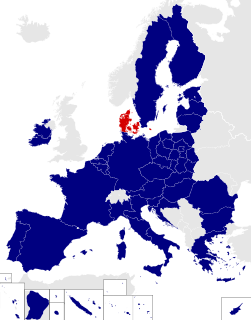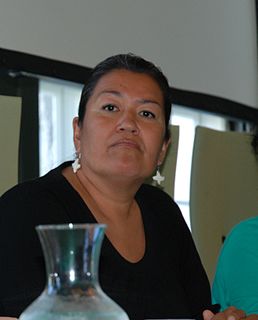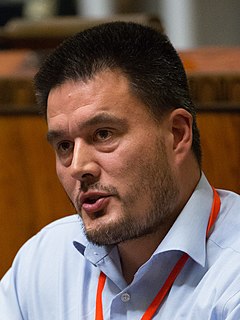The politics of Greenland, a "constituent country" of the Kingdom of Denmark, function in a framework of a parliamentary representative democratic dependency, whereby the prime minister is the head of government, and of a multi-party system. Executive power is exercised by the government. Legislative power is vested in both the government and parliament Inatsisartut. The judiciary is independent of the executive and the legislature. Greenland has full autonomy on most matters, except on policies and decisions affecting the region including negotiations with the devolved legislatures and the Folketing.

Hans Enoksen is a Greenlandic politician who served as the third Prime Minister of Greenland from 2002 to 2009.
There are three types of elections in Denmark: elections to the national parliament, local elections and elections to the European Parliament. Referendums may also be called to consult the Danish citizenry directly on an issue of national concern.

Inuit Ataqatigiit is a democratic socialist and separatist political party in Greenland striving to make Greenland an independent state. The party, founded in 1976, was born out of the increased youth radicalism in Denmark during the 1970s. Formerly in favour of a socialist economy the party has gradually moved towards a more pragmatic approach supporting a market economy and privatisation. It believes that an independent Greenland should be competitive.
Greenland elects on national level a legislature. The Greenlandic Parliament has 31 members of parliament, elected for a four-year term by proportional representation. Greenland have a multi-party system, with numerous parties in which a single party normally does not have a chance of gaining power alone, and therefore the parties must work together in order to form a coalition government.

General elections were held in Denmark on 22 November 1966, although in Greenland the elections were held on 6 December 1966. The Social Democratic Party remained the largest in the Folketing, with 69 of the 179 seats. Voter turnout was 88.6% in Denmark proper, 48.8% in the Faroe Islands and 59.0% in Greenland.
The Democrats is a liberal and unionist political party in Greenland.

Denmark is one single European Parliament constituency. Since the June 2009 Parliament election it has been represented by thirteen members of the European Parliament. It covers the EU member state of Denmark, but not the Faroe Islands or Greenland which are not part of the EU.
The 2000 Redditch Borough Council election took place on 4 May 2000 to elect members of Redditch Borough Council in Worcestershire, England. One third of the council was up for election and the Labour party stayed in overall control of the council.

Prior to its secession from the European Community in 1985, Greenland was a constituency of the European Parliament for European elections.
General elections were held in Greenland on 2 June 2009. Prime Minister Hans Enoksen announced the election date on 15 April 2009, stating that he would prefer for a newly elected parliament to administer Greenland when the self-government reform takes effect on 21 June 2009. The reform gave more power to the Greenlandic parliament with decisions on most issues being devolved to the parliament but defence and foreign affairs remaining under the control of Denmark.
The Naalakkersuisut is the government of Greenland, a "constituent country" of the Kingdom of Denmark, takes place in a framework of a parliamentary representative democratic country, whereby the prime minister is the head of government, and of a multi-party system. Executive power is exercised by the government. Legislative power is vested in both the government and parliament Inatsisartut. The judiciary is independent of the executive and the legislature. Greenland has full autonomy on most matters, except on policies and decisions affecting the region including negotiations with the devolved legislatures and the Folketing.

General elections were held in the Kingdom of Denmark on 18 June 2015 to elect the 179 members of the Folketing. 175 members were elected in the Denmark proper, two in the Faroe Islands and two in Greenland. Although the ruling Social Democrats remained the largest party in the Folketing and increased the number of seats they held, the opposition Venstre party was able to form a minority government headed by Lars Løkke Rasmussen with the support of the Danish People's Party, the Liberal Alliance and the Conservative People's Party.

General elections were held in Greenland on 12 March 2013. The opposition Siumut party emerged as the largest in Parliament, winning 14 of the 31 seats. On 26 March Siumut leader Aleqa Hammond became Greenland's first female Prime Minister.

Early general elections were held in Greenland on 28 November 2014. They were called after Prime Minister Aleqa Hammond resigned following a spending scandal. Siumut and Inuit Ataqatigiit emerged as the largest parties both winning 11 of the 31 seats. A three party coalition government was formed consisting of the incumbent Siumut and Solidarity parties alongside the Democrats.

General elections will be held in the Kingdom of Denmark after either the dissolution or expiry of the current Parliament, and must be held on or before 17 June 2019. All 179 members of the Folketing will be elected. 175 members will be elected in Denmark proper, two in the Faroe Islands and two in Greenland.

Atassut is a liberal-conservative and unionist political party in Greenland. Founded on 29 April 1978, Atassut is an established partner of the Liberal Party of Denmark.












